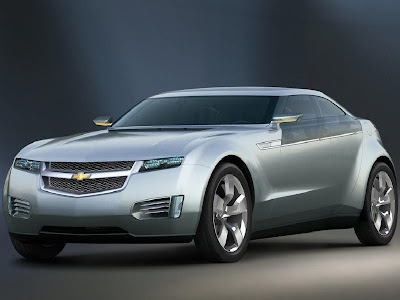 General Motors announced earlier today that its Chevrolet Volt rechargeable electric car (due out in 2010) is estimated to get 230 miles per gallon in the city, according to early tests that adhere to guidelines from the U.S. Environmental Protection Agency for calculating the mileage of extended range electric vehicles.
General Motors announced earlier today that its Chevrolet Volt rechargeable electric car (due out in 2010) is estimated to get 230 miles per gallon in the city, according to early tests that adhere to guidelines from the U.S. Environmental Protection Agency for calculating the mileage of extended range electric vehicles.Incidentally, 230 mpg is more than four times the gas mileage of the Toyota Prius, widely considered to be the most efficient electric car on the market at the current time. (It gets about 48 mpg in the city and 45 mpg on the highway.)
The Chevy Volt's gas tank will hold between six and ten gallons, meaning people who drive mostly in the city could travel over a thousand miles between trips to the gas station.
According to the Associated Press, the Volt is powered by an electric motor and a battery pack that boasts a 40-mile range. Once the car is driven past that point (without recharging), the vehicle's small internal combustion engine generates enough electricity for a total range of 300 miles.
By theory, those who never drive more than 40 miles at a time would never require gasoline.
Perhaps the most exciting aspect of the car, however, is that the battery pack can be recharged using a standard home outlet.
Thus far, highway mileage estimates have yet to be released for the Volt, but GM believes the combined highway and city mileage for the car will be in triple digits.
The gas mileage won't be the only high aspect of the car, however. Because it is a first-generation release, GM will likely put a price tag in the $40,000 range for its 2010 models. Even with qualifying federal government tax credits, the price precludes a large percentage of American consumers from owning the Chevy Volt next year.
Of course, General Motors is working to knock the cost down of the vehicle, particularly the battery system, in the forseeable future.
Hopefully that will happen soon, but in the meantime, it's hard not to be excited by the technological potential of U.S. automakers.





No comments:
Post a Comment